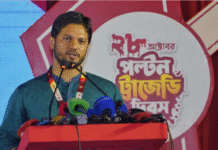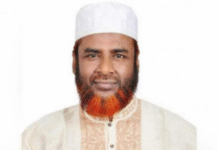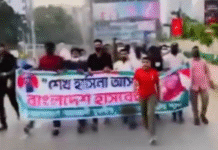AL re-elects Hasina, Ashraf; party charter, RPO flouted as no election for other
Sheikh Hasina and Syed Ashraful Islam were re-elected Awami League president and general secretary unopposed at the party's national council yesterday.
They were also given the power to choose other members of the AL central committee in clear violation of the party charter and Representation of People Order.
The AL charter mandates the councillors to elect all leaders, including a treasurer, 13 members of presidium, its highest policymaking body; 31 secretaries, including three joint general secretaries and seven organising secretaries.
The party chief can only select 26 members of its highest decision-making forum, the AL Central Working Committee.
Also as a political party registered under the RPO, the Awami League was supposed to elect the entire central committee.
The national council's outcome raises a question whether voting rights of councillors can be delegated to others.
Contacted last evening over telephone, eminent jurist Shahdeen Malik said voting rights can be delegated to others in a private company where the largest shareholder has the controlling authority.
“Similarly, our political parties seem to function as privately owned companies where the top leaders exercise the power of ownership.”
Hence, it is not surprising that a councillor delegates his/her voting rights to the “absolute owner of the party”, he added.
AL leader advocate Rahmat Ali, who was the chief election commissioner at the council, also acknowledged that voting rights cannot be delegated.
When his attention was drawn to the council's decision, he said the councillors exercised their voting rights by empowering Sheikh Hasina and Syed Ashraf to choose other leaders of the central committee.
Rahmat Ali also claimed the way he conducted the election session in the council contradicted neither the party charter nor the RPO.
Interestingly, hours before being re-elected, Syed Ashraf, also the LGRD minister, in the inaugural session said the country will be run as per the constitution and the party as per its charter.
The last council in July 2009, too, elected Hasina and Ashraf as the top-most leaders and gave them authority to pick other office bearers.
But it was expected that the party would honour its own charter and the RPO by holding elections to all the posts in a new beginning of the intra-party democracy.
The AL's 2008 electoral manifesto “the charter for change” had also pledged steps to establish democratic principles within the party.
The main opposition BNP in its national council on December 8, 2009, followed the path taken by AL.
It re-elected Khaleda Zia chairperson and authorised her to pick other office bearers and members for the national executive and standing committees, ignoring the party charter that stipulates election to the posts.
Yesterday, after the inauguration of AL national council at the historic Suhrawardy Udyan in the morning, the council session to elect new leadership began in the afternoon at the Institution of Engineers, Bangladesh.
The election procedures began after Sheikh Hasina had dissolved the central committee she had been heading since the 2009 council.
Hasina's cousin Sheikh Fazlul Karim Selim, a presidium member of the just dissolved central committee, proposed her name for the president post and Syed Ashraf supported.
And she was elected unopposed to lead the ages-old political party for the next three years. This is the seventh time in a row she becomes the party chief.
“I sought to know if there is any alternative proposal. I found no response. Then I declared her elected,” Rahmat Ali told The Daily Star.
The process was same for electing the general secretary.
Mahbubul Alam Hanif and Jahangir Kabir Nanok, two joint general secretaries of outgoing central committee, respectively proposed and supported Ashraf's name for general secretary.
Rahmat then moved to hold polls to other posts.
“I asked councillors how you will like to hold the elections to other posts. In response, the councillors proposed the newly elected president and general secretary be empowered to choose leaders to complete the formation of the central committee,” he said.
“And I went by the councillors' decision. I did everything as per the party's constitution.”
The entire procedure annoyed many councillors who expected that elections would be held to other posts.
Talking to The Daily Star after the election session, many of them alleged that the proposal to empower Hasina-Ashraf was made and supported in line with the party high-command directives. Nobody could oppose it.
Immediately, after his re-election, Syed Ashraf said the president and general secretary were elected unopposed as councillors have confidence in them.
“It's a landmark decision. I think Awami League has taken the right decision; it never takes any wrong decision.”
From now on, he said, the party will start preparing for the next parliamentary polls.
Sheikh Hasina at the election session declared that she would consult the general secretary and other senior leaders to complete the formation of the central committee, he said.
“I don't think any major change will come in the new central body,” Ashraf said, adding that some new faces will be included while some from the immediate-past committee will be dropped.
Source: The Daily Star











Same old same old. Bangladesh cannot expect anything new in next decade.